【精品原创资料】Beijing Opera (Peking Opera) 京剧 英语介绍 英语专业作业Presentation
- 格式:ppt
- 大小:19.65 MB
- 文档页数:50
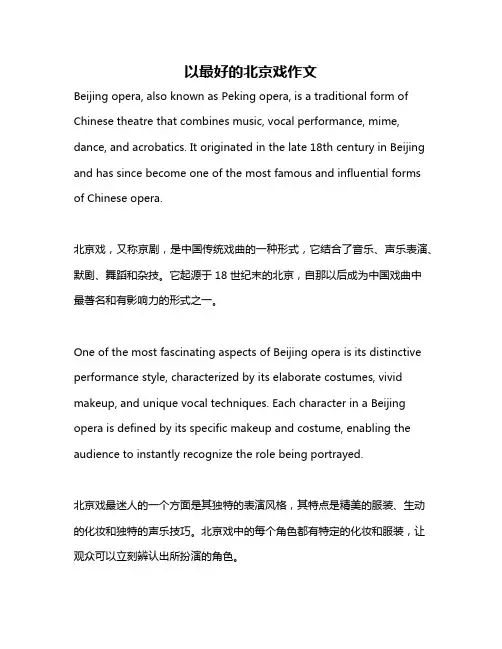
以最好的北京戏作文Beijing opera, also known as Peking opera, is a traditional form of Chinese theatre that combines music, vocal performance, mime, dance, and acrobatics. It originated in the late 18th century in Beijing and has since become one of the most famous and influential forms of Chinese opera.北京戏,又称京剧,是中国传统戏曲的一种形式,它结合了音乐、声乐表演、默剧、舞蹈和杂技。
它起源于18世纪末的北京,自那以后成为中国戏曲中最著名和有影响力的形式之一。
One of the most fascinating aspects of Beijing opera is its distinctive performance style, characterized by its elaborate costumes, vivid makeup, and unique vocal techniques. Each character in a Beijing opera is defined by its specific makeup and costume, enabling the audience to instantly recognize the role being portrayed.北京戏最迷人的一个方面是其独特的表演风格,其特点是精美的服装、生动的化妆和独特的声乐技巧。
北京戏中的每个角色都有特定的化妆和服装,让观众可以立刻辨认出所扮演的角色。
Moreover, Beijing opera is renowned for its combination of singing, speaking, recitation, and acting, known as "cheng, shi, zhu, xing" in Chinese. This multifaceted art form requires performers to master a wide range of skills, from vocal control to martial arts techniques, making it a highly demanding and immersive art form.此外,京剧以其汇集了唱、念、做、表的表演方式而闻名,中国戏曲中称为“唱、念、做、表”。
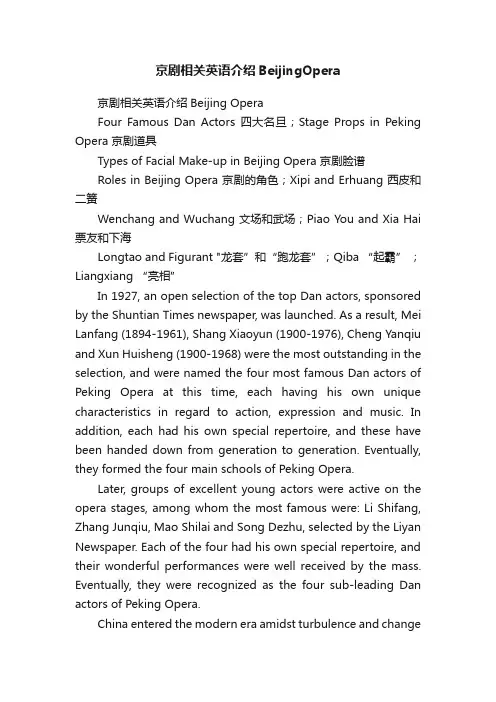
京剧相关英语介绍BeijingOpera京剧相关英语介绍Beijing OperaFour Famous Dan Actors 四大名旦;Stage Props in Peking Opera 京剧道具Types of Facial Make-up in Beijing Opera 京剧脸谱Roles in Beijing Opera 京剧的角色;Xipi and Erhuang 西皮和二簧Wenchang and Wuchang 文场和武场;Piao You and Xia Hai 票友和下海Longtao and Figurant "龙套”和“跑龙套”;Qiba “起霸” ;Liangxiang “亮相”In 1927, an open selection of the top Dan actors, sponsored by the Shuntian Times newspaper, was launched. As a result, Mei Lanfang (1894-1961), Shang Xiaoyun (1900-1976), Cheng Yanqiu and Xun Huisheng (1900-1968) were the most outstanding in the selection, and were named the four most famous Dan actors of Peking Opera at this time, each having his own unique characteristics in regard to action, expression and music. In addition, each had his own special repertoire, and these have been handed down from generation to generation. Eventually, they formed the four main schools of Peking Opera.Later, groups of excellent young actors were active on the opera stages, among whom the most famous were: Li Shifang, Zhang Junqiu, Mao Shilai and Song Dezhu, selected by the Liyan Newspaper. Each of the four had his own special repertoire, and their wonderful performances were well received by the mass. Eventually, they were recognized as the four sub-leading Dan actors of Peking Opera.China entered the modern era amidst turbulence and changein the 20th century. The Revolution of 1911 put an end to the 2,000-year rule of the feudal dynasties. Thus there was a spate of famous actors and actresses and schools of Peking Opera in the early decades of this century.二十世纪20年代年京剧旦行先后成名的四位有代表性的演员:梅兰芳、尚小云、程砚秋、荀慧生。
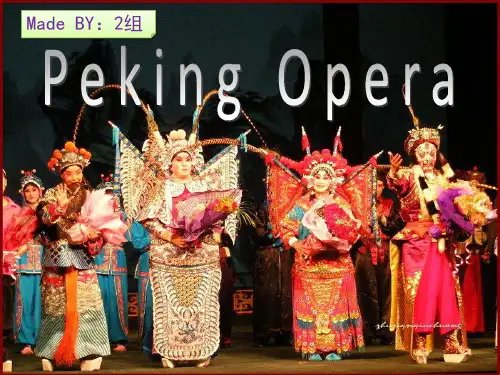
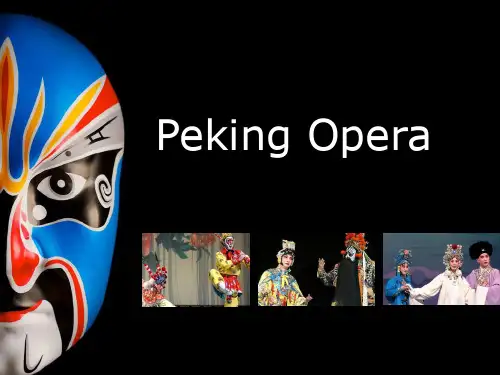
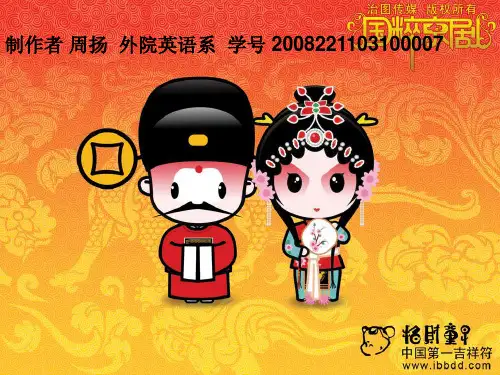
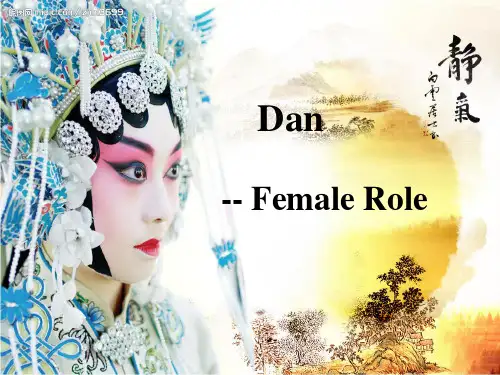
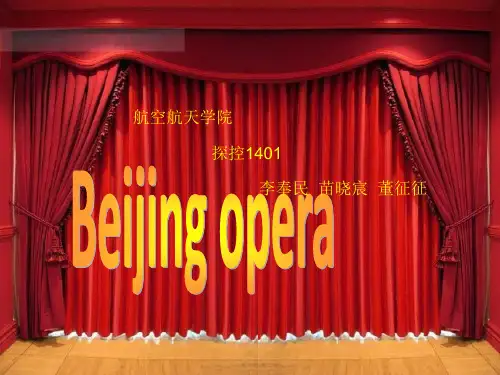
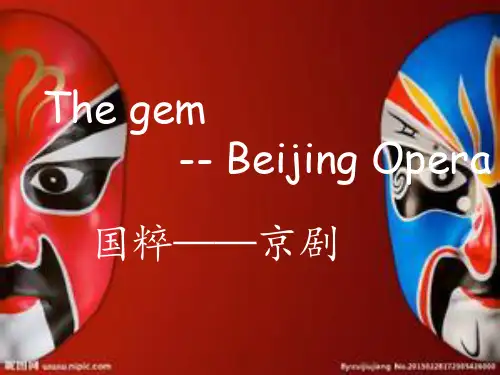
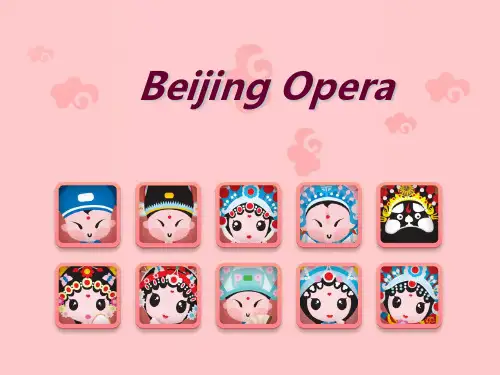
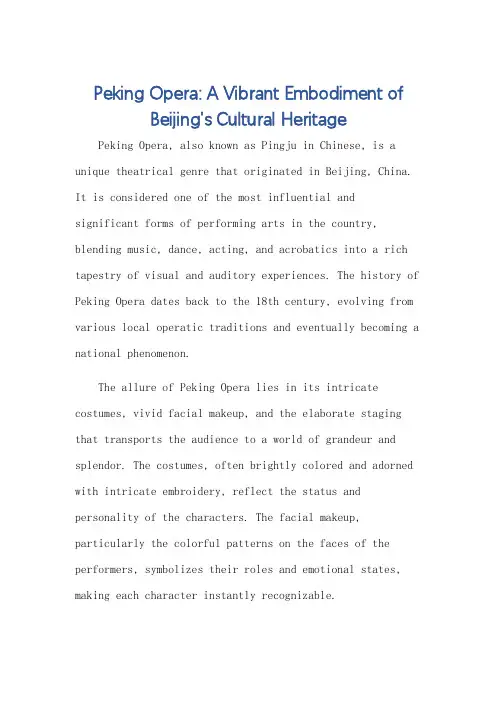
Peking Opera: A Vibrant Embodiment ofBeijing's Cultural HeritagePeking Opera, also known as Pingju in Chinese, is a unique theatrical genre that originated in Beijing, China. It is considered one of the most influential andsignificant forms of performing arts in the country, blending music, dance, acting, and acrobatics into a rich tapestry of visual and auditory experiences. The history of Peking Opera dates back to the 18th century, evolving from various local operatic traditions and eventually becoming a national phenomenon.The allure of Peking Opera lies in its intricate costumes, vivid facial makeup, and the elaborate staging that transports the audience to a world of grandeur and splendor. The costumes, often brightly colored and adorned with intricate embroidery, reflect the status and personality of the characters. The facial makeup, particularly the colorful patterns on the faces of the performers, symbolizes their roles and emotional states, making each character instantly recognizable.The music and singing in Peking Opera are also distinctive, featuring a unique blend of traditional instruments like the gongs and cymbals, the erhu, and the pipa. The melodies are often melodic and harmonious, complementing the emotional depth of the performances. The singing, known as "chanting," requires exceptional breath control and skillful modulation of voice, making it both powerful and expressive.The acting in Peking Opera is renowned for its physicality and exaggeration, with performers often employing gestures and movements that are both highly stylized and deeply emotional. This style of acting, known as "performing with gestures," allows the performers to convey complex emotional states and storylines with remarkable clarity and depth.The acrobatics and martial arts elements in Peking Opera further enhance the visual appeal of the performances. Performers engage in feats of flexibility, balance, and strength, often incorporating martial arts moves into their routines. These acrobatic displays not only amaze theaudience but also serve to emphasize the emotional and narrative arcs of the plays.Peking Opera's repertoire is vast and diverse, covering a wide range of subjects and genres. From historical epics and legends to comic sketches and folk tales, these plays are rich in storytelling and character development. The plots often revolve around themes of love, loyalty, vengeance, and moral dilemmas, reflecting the values and beliefs of Chinese society.Peking Opera is not just a form of entertainment; it is a cultural phenomenon thatreflects the rich history, traditions, and values of the Chinese people. It is a testament to the creativity and genius of generations of performers, composers, writers, and designers who have dedicated their lives to preserving and enhancing this unique theatrical genre.Today, Peking Opera remains a vibrant and relevant part of Chinese culture, attracting both domestic and international audiences. With its enchanting performances and profound narratives, it continues to captivate andinspire people from all over the world, serving as a powerful ambassador for China's rich cultural heritage.**京剧:北京文化遗产的生动体现**京剧,在中国也称为平剧,是一种起源于北京的独特戏剧形式。
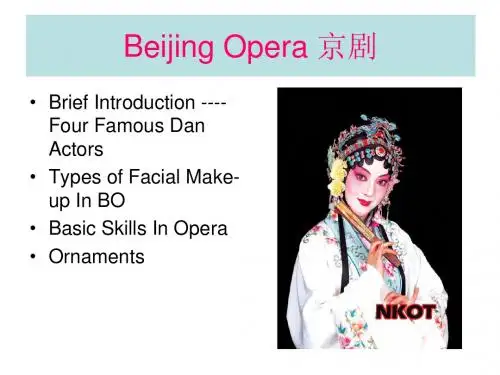
京剧(Beijing Opera)又称平剧、京戏,是中国影响最大的戏曲剧种,分布地以北京为中心,遍及全国。
清代乾隆五十五年起,原在南方演出的三庆、四喜、春台、和春四大徽班陆续进入北京,他们与来自湖北的汉调艺人合作,同时接受了昆曲、秦腔的部分剧目、曲调和表演方法,又吸收了一些地方民间曲调,通过不断的交流、融合,最终形成京剧。
京剧流播全国,影响甚广,有“国剧”之称。
它走遍世界各地,成为介绍、传播中国传统文化的重要手段。
京剧是在北京形成的戏曲剧种之最,至今已有200年的历史。
它是在徽戏和汉戏的基础上,吸收了昆曲、秦腔等一些戏曲剧的优点和特长逐渐演变而形成的。
公元1790年(清乾隆55年),徽戏开始进京。
最早进京的徽戏班是享有盛名的安徽“三庆班”,随后又有“四喜”、“和春”、“春台”诸班,史称“四大徽班”(四大徽班从扬州进京)。
四大徽班和以后陆续进京的徽班,以其优美动听的唱腔和卓越的表演受到观众的欢迎。
[1]现在它仍是具有世界级影响的大剧种。
它的行当全面、表演成熟、气势宏美,是近代中国汉族戏曲的代表。
[2]京剧起源于四个地方的剧种:一是原来流行于安徽省一带的徽剧;二是流行于湖北的汉剧;三是流行于江苏一带的昆曲;四是流行于陕西的秦腔,又叫梆子。
清乾隆末期、嘉庆初期四大徽班进北京后,于嘉庆、道光年间同来自湖北的汉调艺人合作,互相影响,逐渐接受了昆曲、秦腔的部分剧目、曲调和表演方法,并吸收了一些民间曲调、北京土语,逐渐融合发展。
[3]唱指歌唱,念指具有音乐性的念白,二者相辅相成,构成歌舞化的京剧表演艺术两大要素之一的“歌”,做指舞蹈化的形体动作,打指武打和翻跌的技艺,二者相互结合,构成歌舞化的京剧表演艺术两大要素之一的“舞”。
唱、念、做、打京剧表演的四种艺术手法,也是京剧表演四项基本功。
戏曲演员从小就要从这四个方面进行训练,虽然有的演员擅长唱功(唱功老生),有的行当以做功(花旦)为主,有的以武打为主(武净)。
介绍北京戏曲的英语作文Introduction to Beijing OperaBeijing Opera, also known as Peking Opera, is a traditional Chinese art form that has been popular for over two hundred years. It is a vibrant and colorful combination of music, dance, martial arts, and acting. With its distinctive style and unique features, Beijing Opera has become one of the most famous forms of Chinese opera.HistoryBeijing Opera originated in the late 18th century during the reign of the Qing Dynasty Emperor Qianlong. It was created by combining various regional opera styles with elements of local folk music and dance. Over time, Beijing Opera evolved into a sophisticated art form with its own distinct characteristics and performance techniques.CharacteristicsOne of the most striking features of Beijing Opera is its elaborate costumes and makeup. Performers wear brightly colored costumes that represent different characters, such as warriors, princesses, and gods. The makeup, known as "jing," iscarefully applied to create exaggerated facial expressions that convey the emotions and personalities of the characters.Another important aspect of Beijing Opera is its use of traditional Chinese musical instruments, such as the erhu (atwo-stringed fiddle) and the pipa (a pear-shaped lute). The music is accompanied by percussion instruments, such as drums and gongs, which help to create a dynamic and rhythmic sound.PerformanceBeijing Opera performances are a spectacle of sight and sound, with performers showcasing their skills in singing, acting, and acrobatics. The actors use a combination of gestures, movements, and facial expressions to convey the emotions and actions of the characters. The performers also engage in martial arts sequences, known as "fighting scenes," which showcase their agility and strength.Audiences are captivated by the dramatic storytelling, colorful costumes, and high-energy performances of Beijing Opera. The traditional stories often revolve around themes of loyalty, honor, and sacrifice, making them both entertaining and thought-provoking.LegacyBeijing Opera has had a lasting impact on Chinese culture and has influenced other forms of art, such as Chinese cinema and theater. It has also gained international recognition and has been performed in countries around the world. Despite the challenges of modernization and changing tastes, Beijing Opera continues to thrive as a cherished cultural heritage of China.In conclusion, Beijing Opera is a captivating art form that showcases the rich traditions and history of Chinese culture. With its vibrant costumes, dynamic performances, and timeless stories, it continues to enchant audiences and inspire artists around the world.。
Peking Opera: A Vibrant Embodiment ofBeijing's Cultural HeritagePeking Opera, also known as Beijing Opera, is a unique form of traditional Chinese theatre that has been a cherished part of Beijing's cultural identity for centuries. Originating in the late 18th century, it has since evolved into a highly stylized and intricate performance art, blending music, dance, acrobatics, and drama into a captivating display.The essence of Peking Opera lies in its blend of visual and auditory artistry. The costumes, which are brightly colored and elaborately designed, reflect the status and personality of each character. The facial paintings, known as "face谱," are an intricate form of symbolism, communicating the character's moral traits and emotional states. The music, with its distinctive melodies and rhythmic patterns, complements the drama, creating a harmonious symphony of sound and movement.The performances are centered around a group of actors, known as the "four major roles": Sheng (male lead), Dan (female lead), Jing (painted face male roles), and Chou(clownish roles). Each role requires a unique set of skills and talents, from the delicate singing and dancing of the Dans to the powerful acrobatics and vocalizations of the Jings.Peking Opera's narratives are typically drawn from historical and mythical sources, offering a window into ancient Chinese culture and values. These stories, often with moral lessons and themes of good versus evil, are presented in a highly stylized format, with actors delivering their lines in a rhythmic and melodic cadence known as "sing-speaking."In recent years, Peking Opera has faced challenges from modern entertainment forms, but it remains a vibrant and relevant part of Beijing's cultural landscape. Its enduring popularity is a testament to the power of traditional art forms in connecting people to their heritage and cultural identity.Peking Opera is not just a form of entertainment; it is a living testament to Beijing's rich cultural history. Itis a powerful reminder of the city's past, a vibrant celebration of its present, and an inspiring vision of itsfuture. As Beijing continues to evolve and modernize, sotoo does Peking Opera, adapting and innovating while remaining true to its core values and traditions.**京剧:北京文化遗产的生动体现**京剧,也称为北京歌剧,是一种独特的中国传统戏剧形式,几百年来一直是北京文化身份的重要组成部分。
一枝独秀的中国艺术——京剧
■ 文 艾怡良京剧(Beijing Opera)又称平剧、京戏,是中国影响最大的戏曲剧种,分布地以北京为中心,遍及全国。
京剧是具有世界级影响的大剧种。
它的行当全面、表演成熟、
气势宏美,是近代中国汉族戏曲的代表,有“国剧”之称。
它走遍世界各地,成为介绍、
传播中国传统文化的重要手段。
青春期健康
·人口文化
76
博采,从昆曲、梆子、大鼓及京剧青衣、花脸、老旦各行中借鉴,融于演唱之中,期的又一标志。
这一时期除杨派(小楼),梅派(兰芳)、尚派(小云)、程派(砚
青春期健康·人口文化79。